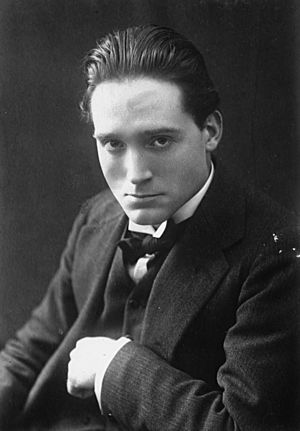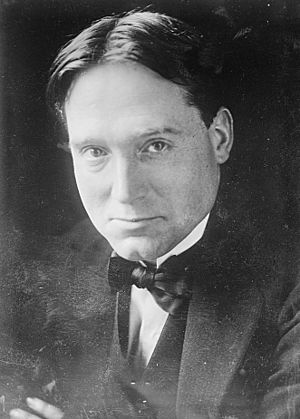Harley Granville-Barker facts for kids
Quick facts for kids
Harley Granville-Barker
|
|
|---|---|
 |
|
| Born | Harley Granville-Barker 25 November 1877 London, England, UK |
| Died | 31 August 1946 (aged 68) Paris, French Fourth Republic |
| Occupation |
|
| Language | English |
| Nationality | English |
| Period | Edwardian era |
| Genre | Drama |
| Notable works | The Voysey Inheritance, Waste, The Madras House |
| Notable awards | Shakespeare Lecture (1925) |
| Spouse | Lillah McCarthy Helen Huntington |
Harley Granville-Barker (born November 25, 1877 – died August 31, 1946) was a very important English person in the world of theatre. He was an actor, director, writer of plays (playwright), theatre manager, critic, and a thinker about theatre.
He first became famous as an actor, especially in plays by George Bernard Shaw. Later, he focused more on directing. He became a key figure in British theatre during the Edwardian era (early 1900s) and between the two World Wars. As a writer, his plays often dealt with serious topics. People had mixed feelings about them when he was alive, but they are still studied today.
Contents
Biography
Early Life and Acting Career
Harley Granville-Barker was born in London, England, on November 25, 1877. He left school when he was 14 years old and started acting. He was very good at playing smart and dreamy characters.
He got many famous roles, like:
- Tanner in Man and Superman
- Cusins in Major Barbara
- Marchbanks in Candida
- Dubedat in The Doctor's Dilemma
George Bernard Shaw even wrote the characters of Dubedat and Cusins specifically for Granville-Barker. However, by 1911, Granville-Barker decided he no longer wanted to act.
Directing and Theatre Reform
Granville-Barker still loved theatre, so he decided to focus on directing. At that time, directing was not a main focus in English theatre. He used ideas from famous directors like Antoine and Reinhardt. He helped change how plays were produced in England.
Some of his first directing jobs were with the Stage Society. But his directing career really took off in 1904 when he worked with the Royal Court Theatre. From 1904 to 1907, he was known as a major reformer of the Edwardian Stage.
While at the Royal Court, he worked with J.E. Vedrenne. Together, they put on nearly 1,000 performances. Many of these were classic plays, but some were new works. Among the new plays were eleven written by George Bernard Shaw. Granville-Barker often worked closely with Shaw to help stage and direct his plays.
When his time at the Royal Court ended, new chances came up at the Duke of York's Theatre in 1910. This made Granville-Barker realize that Britain needed more theatre companies that performed many different plays (called repertory companies). He had tried to argue for a national theatre in a book with William Archer in 1904. This idea didn't happen, which was a big disappointment for him. However, his efforts did help the growth of local repertory theatres across Britain.
Granville-Barker's directing career really grew with three famous Shakespeare plays at the Savoy Theatre:
- The Winter's Tale (1912)
- Twelfth Night (1912)
- A Midsummer Night's Dream (1914)
For these plays, he removed the old-fashioned, detailed scenery. Instead, he used simple, symbolic scenery. He also made sure all the actors worked together as a team, which was a new idea.
Writing Plays and Books
In 1905, Granville-Barker wrote The Voysey Inheritance. This play is considered a masterpiece of the Edwardian period. However, his other plays were not always easy for audiences to understand. People sometimes found them confusing.
His writing style was similar to the Russian writer Chekhov. It focused on feelings and actions that were "under the surface" rather than obvious. Even if his audience didn't always understand him, Granville-Barker still used his plays to talk about important issues in society. In 1909, three of his plays were published: The Voysey Inheritance, Waste, and The Marrying of Ann Leete.
Granville-Barker's most famous prose work is Prefaces to Shakespeare. He wrote these from 1927 until he died in 1946. These books were the first major studies of Shakespeare's plays that focused on how they should actually be performed on stage. The prefaces were published in two books in 1946 and 1947.
Personal Life and Later Years
In 1906, Granville-Barker married his first wife, Lillah McCarthy. They had met much earlier, in 1895, when he was 17 and they were both acting in a touring company. They worked together often in theatre. McCarthy played a main part in his personal and work life until they separated after World War I.
He later divorced McCarthy and married an American writer named Helen Huntington. Helen was a regular theatre-goer and a writer herself. She later became Granville-Barker's helper in his work.
He settled in Paris, France, where he worked with Helen Huntington to translate comedies by Spanish writers like Martínez Sierra and the Álvarez Quintero brothers.
When Second World War started, Granville-Barker left France for Spain, and then moved to the United States. In America, he gave lectures at Harvard University. He also worked for the British Information Services. After the war ended, he returned to France. He died in Paris on August 31, 1946. He was known for supporting left-wing ideas and even turned down an offer to become a knight.
See also
 In Spanish: Harley Granville-Barker para niños
In Spanish: Harley Granville-Barker para niños


